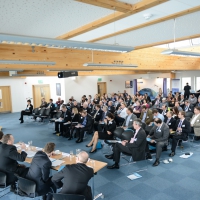The UK Government has set out measures to plan an energy system based on homegrown clean energy.
The measures include cleaning up a dysfunctional grid system by prioritising the most important projects, speeding up decisions on planning permission by empowering planners to prioritise critical energy infrastructure and expanding the renewable auction process to stop delays and get more projects connected.
These changes and more will be set out by Energy Secretary Ed Miliband today in a detailed plan for achieving the target of clean power by 2030.
The include expanding future CfD auctions to allow projects to enter before they have planning permission.
A reordering of a 739GW grid connection queue to favour the most advanced projects as well as streamlined planning are also on the cards.
Delivering these reforms will unleash £40 billion a year of mainly private investment in homegrown clean power projects and infrastructure across the country, creating good jobs across the country including engineers, welders and mechanics, the government said.
The announcements aim to deliver on the Prime Minister’s Plan for Change which aims to drive economic growth and rebuild Britain with mission-driven government, it added.
The government aims for the plan to provide clarity on what the energy mix will look like for 2030 on a national and regional level, including updating the National Policy Statements for energy that guide planners so they have clear direction on the importance of delivering the right amounts of clean power and energy infrastructure for 2030.
The government is also bringing onshore wind back into the Nationally Significant Infrastructure Project (NSIP) regime in England, making it easier to progress onshore farms larger than 100MW.
London will bring forward a Planning and Infrastructure Bill with measures to streamline the delivery of critical infrastructure in the planning process.
It will also ensure communities directly benefit from hosting clean energy infrastructure.
The plan will provide the foundation for the UK to build an energy system that can bring down bills for households and businesses for good.
The independent National Energy System Operator (NESO) set out pathways to a clean power system in 2030, and confirmed it was deliverable, more secure, and could see a lower cost of electricity, and lower bills.
Miliband said: “The era of clean electricity is about harnessing the power of Britain’s natural resources so we can protect working people from the ravages of global energy markets.
“The clean power sprint is the national security, economic security, and social justice fight of our time – and this plan gives us the tools we need to win this fight for the British people.”
Greenpeace UK’s policy director, Doug Parr, said: “The winds of change are finally blowing in the right direction.
“But this roadmap must treble the amount of power generated by offshore wind and solar and double onshore wind, at least, if it’s to deliver the kind of ambition needed to turbocharge our way to a renewably powered future.
“As well as making the UK cleaner and greener this plan should fuel a surge in renewables supply chain jobs and so be celebrated by industry and campaigners alike.
“However, a plan for clean power cannot continue to rely on destructive biomass, or extend the life of climate-wrecking oil and gas by assigning capacity to carbon capture and storage.
“Any money earmarked for CCS – which is expensive, impossible to make zero carbon and fails to detach electricity prices from the volatile international gas market – would be better spent on the renewables, grid and storage infrastructure that will actually deliver clean power.”
Source: reNews












